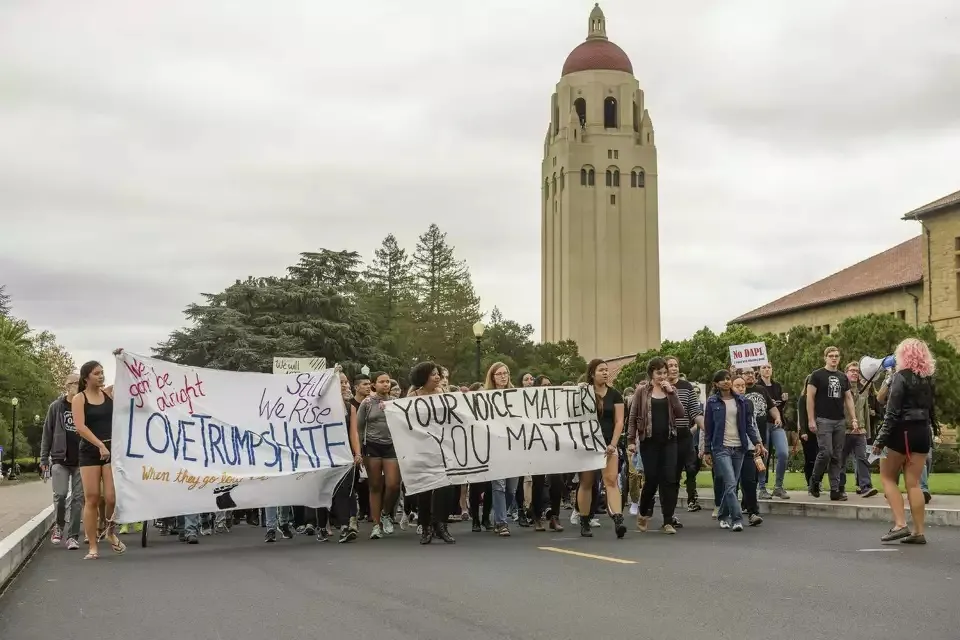Table of Contents
At the core of the Democratic Party platform is the notion of tolerance. We see this in a range of topics: from gender-affirming surgeries to marijuana legalization. These positions exemplify how Democrats market themselves as being a party that strives to be accepting of others and their individual life choices. But this presentation is a farce.
Progressivism, which has co-opted the mainstream Democratic party, has never been about tolerance. To be truly tolerant, you must ultimately tolerate those who fall outside of your Overton window—the “acceptable” range of ideas—and not merely those within your coalition. Yet hardened progressives reject the principle of tolerance wholesale. Nowhere is this fact more apparent than on college campuses.
I, like many of my conservative friends, surround myself with people from across the political spectrum. I am naturally going to befriend more left-leaning people than right-leaning, simply because of the preponderance of Stanford students who identify as liberals, progressives, and Democrats. It’s simple math. It is also precisely because of this imbalance that left-leaning students do not need to venture outside of their echo chambers to make friends. I have seldom met a right-leaning peer that traffics exclusively with other conservatives; the same cannot be said for progressives.
Coming from a D+34 district in New York City (NY-12), I was no stranger to being surrounded by a sea of leftism. Virtually all of my high school teachers were openly progressive. My parents were both relatively liberal. Living in this environment, I was constantly presented with views that I disagreed with, sometimes vehemently.
Yet I always took our disagreements as a learning opportunity to discover alternative points of views, while reaffirming my own beliefs by respectfully debating issues with my peers. I met people where they were and tried to find commonalities where I could. But I always knew that these individuals, no matter how far to the left they were, were decent humans who just supported a different set of policies than me. People who simply believed in a different value set or way of life than I did. That is the beauty of democracy, and this incredible republic we call America.
It was my hope that people on the left would extend the same grace that I try to extend to them. To meet me where I am. Sometimes this happened. Oftentimes, it didn’t.
During one of my first few weeks at Stanford, I was taking a stroll with some colleagues and one of my peers mentioned she was studying political science. I said, “That’s so cool! I’m not a poli-sci major, but I consider myself to be a political junkie of sorts. I can’t get enough of it.”
We proceeded to chat and eventually she asked what publications I read. I generally try to consume lots of media, so I told her I watch a bit of CNN, a little Fox, and read a lot of the Wall Street Journal. “Oh, you’re one of those people,” she replied. I suppose she had (correctly) assumed some of my political beliefs. We continued down this thread for a while longer, but the tenor of our conversation had become noticeably different. There was a palpable air of disgust emanating from her.
I have many friends who are staunch Democrats. I would never abandon our friendship or preclude it altogether because of a political disagreement. Politics is merely one avenue through which friends can connect. But why does it seem that this level of tolerance only extends one way?
This disparity is particularly appalling when we examine a supposed core tenet of progressivism: diversity, equity, and inclusion, or DEI. Democrats have campaigned on being a party of tolerance and acceptance, yet when it comes to open discussion and the exchange of ideas, progressives are often the least tolerant people.
If we look back to some of the most prominent voices of the New Left in the 1960s, it becomes clear that intolerance and leftism have always been tied at the hip—especially at universities. In 1965, the father of the “New Left,” philosopher Herbert Marcuse, posited that in order to create a non-repressive civilization, society would need to ban alternative viewpoints that he deemed “non-tolerant.” This framework was known as “Repressive Tolerance” and it has since become the core of modern progressive ideology. In fact, during the “May 68” Paris student revolt, participants held up banners that read “Marx Mao Marcuse.”
Marcuse’s framework is now used in our current political system, in which Democrats use Marcussian logic as an ideological excuse to dismiss Republicans and their concerns. As one example, Senate Majority Leader Chuck Schumer (D-NY) has frequently said that the GOP’s proposed policies to secure America’s porous border are part of its “discrimination agenda.”
Do not believe the PR campaign of the Democratic Party. Progressives are not about tolerance; they are about quashing what they consider intolerant beliefs. If you want to see this sad reality in action, talk to students on campus and express any political opinion that is one inch right-of-center. Then watch as most refuse to entertain said opinion.
Such liberal intolerance needs to end. I call upon all Stanford students to widen your Overton windows. Do not reject conversations outright. And never end a friendship over policy disagreements. We owe it to each other to find common ground and reject echo chambers. In the end, that spirit is what makes America so incredible.









